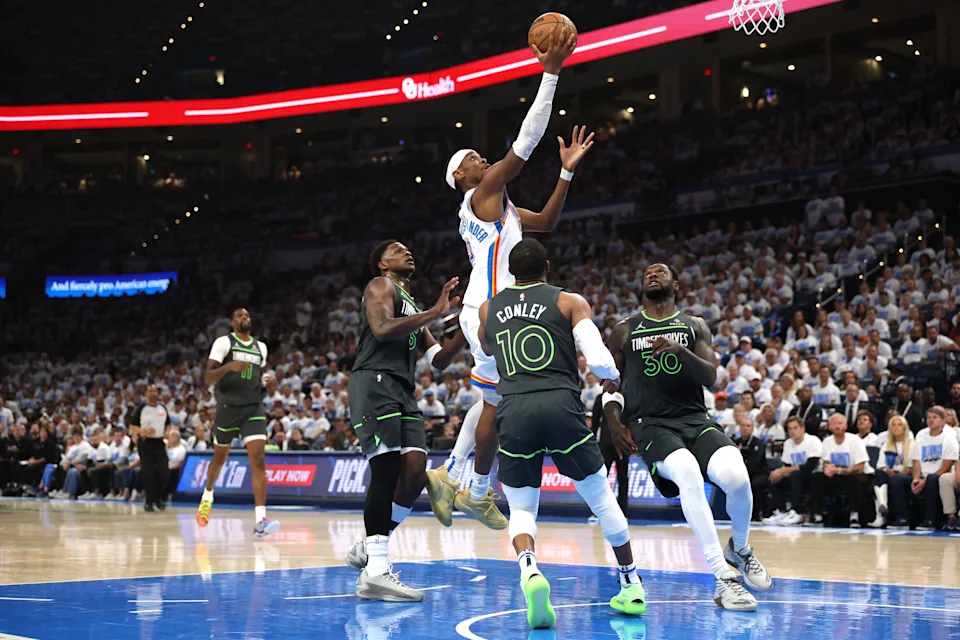Despite a sluggish start and heavy pressure from the Timberwolves, Oklahoma City’s Game 1 win in the Western Conference Finals was a masterclass in mental toughness, defensive discipline, and turning an opponent’s strategy into its downfall.
A mirage of control
It’s easy to believe you’re in charge when playing the Oklahoma City Thunder—until suddenly, you’re not. That illusion, dangerous and disarming, has become OKC’s calling card this postseason. They let you think the tempo is yours to set. Then they flip the switch, and the game unravels into their rhythm before you can stop the bleeding.
Tuesday night in Game 1 of the Western Conference Finals, the Minnesota Timberwolves learned that lesson the hard way. For a half, they looked composed, physical, and in control. Shai Gilgeous-Alexander was struggling. Julius Randle was on fire from deep. The Timberwolves led by four at the break and looked like the better team.
But the second half? That was all Thunder. Oklahoma City outscored Minnesota 70–40 after halftime, delivering a 114–88 knockout that showcased just how dangerous this young team can be—especially when underestimated.
Baiting the trap
The Timberwolves knew the dangers. They’d prepared for OKC’s deadly transition game, their knack for forcing turnovers, and Gilgeous-Alexander’s savvy ability to bait defenders into fouls. And yet, they fell into every trap they swore to avoid.
The Thunder don’t simply defend; they disrupt. They swarm ball handlers, close passing lanes with spider-like limbs, and force shots under duress. The result? Minnesota attempted a staggering 51 threes—over 60% of their total shots—many of them rushed or contested.
Worse still, their offensive composure broke down. Instead of using their size and physicality, they settled for perimeter shots and fell prey to Oklahoma City’s help defense. When they tried to drive, turnovers followed. When they tried to space the floor, timing collapsed. Their brief first-half lead vanished within two minutes of the third quarter.
Mental fortitude and quiet dominance
What made Oklahoma City’s win more impressive was that their best player didn’t even have a stellar night. Gilgeous-Alexander shot just 10-for-27, including a dismal 2-for-13 first half. But his persistence and high basketball IQ kept the Thunder afloat early and helped them take over late.
He drew 14 free throws, kept defenders in foul trouble, and ended the night with 31 points and 9 assists. Meanwhile, the Timberwolves’ primary perimeter defenders—Jaden McDaniels and Anthony Edwards—couldn’t stay on the floor. McDaniels fouled out in just 23 minutes, while Edwards earned a technical in frustration for tossing the ball at Gilgeous-Alexander after a whistle. “We just try to play to our identity,” Gilgeous-Alexander said postgame. “They throw you a problem and you solve it.”
That identity—relentless pressure, mental resilience, and a rotating cast of contributors—has made OKC one of the most balanced teams remaining in the postseason. Jalen Williams hit critical third-quarter shots. Chet Holmgren blanketed the paint with his wingspan. Even role players like Kenrich Williams stepped up, burying a momentum-swinging jumper when the Timberwolves thought they had forced a turnover.
Minnesota’s missed opportunity
For Minnesota, the defeat wasn’t just painful—it was avoidable. Julius Randle’s early outburst (5-for-6 from deep) gave them a cushion. Gilgeous-Alexander was ice cold for much of the first half. And yet, they couldn’t capitalize.
Timberwolves role players who had torched the Warriors from deep—Naz Reid, Nickeil Alexander-Walker, Donte DiVincenzo—combined to shoot just 5-for-28 from three. Edwards and Randle combined for eight turnovers and only 26 points. Minnesota’s offense sputtered, confused by defensive pressure and stripped of rhythm. “We talked about being aggressive in our help,” said Thunder coach Mark Daigneault. “That tends to yield turnovers… but it also yields tough shots, and so that’s what we’re trying to do.”
Even Minnesota’s one “win”—a potential offensive foul on Gilgeous-Alexander—slipped away when OKC retained possession and Williams hit a dagger midrange jumper to extend the lead.
Game 2 and adjustments
Game 1 proved that Oklahoma City’s postseason success is no fluke. This is a team that plays with maturity beyond its years, with a system that forces you to either adapt quickly or get left behind. The Timberwolves, dominant in earlier rounds, now have two days to regroup and find answers.
One of those answers must involve controlling the tempo and refusing to be lured into OKC’s chaos. Another must involve smarter shot selection and getting Anthony Edwards more involved as a creator, not just a scorer. But make no mistake—OKC’s Game 1 dominance was not a product of hot shooting or a lucky run. It was systemic, intentional, and suffocating. They didn’t just beat Minnesota—they dismantled them from the inside out.
The question now is whether the Timberwolves can rewrite the script in time. Because if they don’t, the Thunder might not just win this series—they might redefine it.



